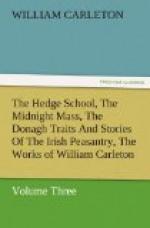I am sorry to perceive the writings of many respectable persons on Irish topics imbued with a tinge of spurious liberality, that frequently occasions them to depart from truth. To draw the Irish character as it is, as the model of all that is generous, hospitable, and magnanimous, is in some degree fashionable; but although I am as warm an admirer of all that is really excellent and amiable in my countrymen as any man, yet I cannot, nor will I, extenuate their weak and indefensible points. That they possess the elements of a noble and exalted national character, I grant; nay, that they actually do possess such a character, under limitations, I am ready to maintain. Irishmen, setting aside their religious and political prejudices, are grateful, affectionate, honorable, faithful, generous, and even magnanimous; but under the stimulus of religious and political feeling, they are treacherous, cruel, and inhuman—will murder, burn, and exterminate, not only without compunction, but with a satanic delight worthy of a savage. Their education, indeed, was truly barbarous; they were trained and habituated to cruelty, revenge, and personal hatred, in their schools. Their knowledge was directed to evil purposes—disloyal principles were industriously insinuated into their minds by their teachers, most of whom were leaders of illegal associations. The matter placed in their hands was of a most inflammatory and pernicious nature, as regarded politics: and as far as religion and morality were concerned, nothing could be more gross or superstitious than the books which circulated among them. Eulogiums on murder, robbery, and theft were read with delight in the histories of Freney the Robber, and the Irish Rogues and Rapparees; ridicule of the Word of God, and hatred to the Protestant religion, in a book called Ward’s Cantos, written in Hudi-brastic verse; the downfall of the Protestant Establishment, and the exaltation of the Romish Church, in Columbkill’s Prophecy, and latterly in that of Pastorini. Gross superstitions, political and religious ballads of the vilest doggerel, miraculous legends of holy friars persecuted by Protestants, and of signal vengeance inflicted by their divine power on those who persecuted them, were in the mouths of the young and old, and of course firmly fixed in their credulity.
Their weapons of controversy were drawn from the Fifty Reasons, the Doleful Fall of Andrew Sail, the Catholic Christian, the Grounds of Catholic Doctrine, a Net for the Fishers of Men, and several other publications of the same class. The books of amusement read in these schools, including the first-mentioned in this list, were, the Seven Champions of Christendom, the Seven Wise Masters and Mistresses of Rome, Don Belianis of Greece, the Royal Fairy Tales, the Arabian Nights’ Entertainments, Valentine and Orson, Gesta Romanorum, Dorastus and Faunia, the History of Reynard the Fox, the Chevalier Faublax; to these I may add, the Battle of Auhrim, Siege of Londonderry,




